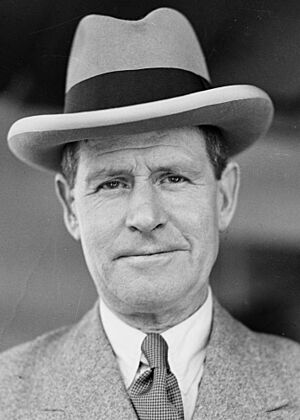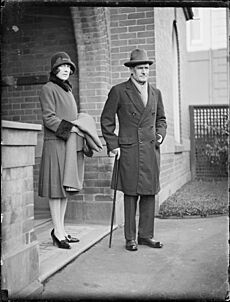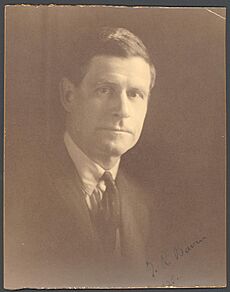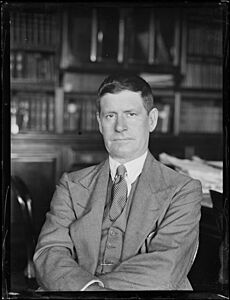Thomas Bavin facts for kids
Quick facts for kids
Sir Thomas Bavin
|
|
|---|---|
 |
|
| 24th Premier of New South Wales Elections: 1927, 1930 |
|
| In office 18 October 1927 – 4 November 1930 |
|
| Preceded by | Jack Lang |
| Succeeded by | Jack Lang |
| Constituency | Gordon (1917–20) Ryde (1920–27) Gordon (1927–35) |
| Personal details | |
| Born |
Thomas Rainsford Bavin
5 May 1874 Kaiapoi, Canterbury, New Zealand |
| Died | 31 August 1941 (aged 67) Bellevue Hill, New South Wales, Australia |
| Nationality | Australian |
| Political party | Nationalist |
| Spouse | Edyth Winchcombe |
| Education | Newington College University of Sydney |
Sir Thomas Rainsford Bavin (5 May 1874 – 31 August 1941) was an important Australian lawyer and politician. He served as the Premier of New South Wales from 1927 to 1930.
Bavin was born in New Zealand. He moved to Australia when he was 15 years old. There, he studied law and became a barrister, which is a type of lawyer. He also worked as a personal secretary for Australia's first two prime ministers. These were Edmund Barton and Alfred Deakin.
In 1917, Bavin was elected to the New South Wales Legislative Assembly. This is like a state parliament. He was the Attorney General of New South Wales twice. This role is the chief legal advisor to the government. He then led the Nationalist Party to win the 1927 state election. His government was defeated in the 1930 election by Jack Lang and the Australian Labor Party.
Contents
Early Life and Education
Thomas Bavin was born in Kaiapoi, New Zealand. His father was a Methodist minister. In 1889, his family moved to Sydney, Australia. Thomas then went to Newington College.
He later studied at the University of Sydney. He earned a Bachelor of Arts degree in 1894. He also got a law degree in 1897. He was a very good student and won a special university medal.
Legal Work and Early Politics
In 1897, Bavin became a lawyer in New South Wales. He was interested in Australian Federation. This was the process of joining the Australian colonies to form one country. He tried to get elected to the New South Wales Legislative Assembly in 1898. He wanted to support federation, but he did not win.
In 1900, Bavin taught law at the University of Tasmania. He then returned to Sydney. In 1901, he married Edyth Winchcombe. Her father was also a politician.
Bavin met Edmund Barton while working on federation. Barton later became Australia's first Prime Minister. In 1901, Barton asked Bavin to be his private secretary. Bavin also worked for the next Prime Minister, Alfred Deakin.
After 1904, Bavin returned to being a lawyer. He also wrote articles for newspapers. He even wrote for a London newspaper. In 1913, he looked into food prices. He suggested creating a special office to check prices and stop monopolies. In 1910, he was elected to the local council in Willoughby. During World War I, he worked as a naval intelligence officer.
Becoming a State Politician
Bavin wanted to join the federal parliament, but he was not chosen. In 1917, he was elected to the New South Wales Parliament. He represented the area of Gordon. He held this seat until 1935. For a few years, he represented the area of Ryde.
Bavin quickly became important in parliament. In 1920, he became the deputy leader of his party. He served as the Attorney-General and Minister for Justice in 1921. He was Attorney-General again from 1922 to 1925. After his party lost the 1925 election, Bavin became the leader of the party. This made him the Leader of the Opposition.
Premier of New South Wales
In 1927, Bavin's party teamed up with the Country Party. They agreed not to run against each other in elections. This team won the 1927 election. On 18 October 1927, Bavin became the Premier of New South Wales. He was also the Treasurer, managing the state's money.
As Premier, Bavin introduced a new income tax law in 1928. This law combined the incomes of husbands and wives. It also made people with higher incomes pay more tax. This made some of his supporters unhappy. The Labor Party wanted to get rid of the Legislative Council. Bavin passed a law that required a public vote to do this.
Bavin was often sick during his time as Premier. This meant he was sometimes away from important meetings. This was especially difficult after the Great Depression started in 1929. There were many strikes during this time. Bavin used workers who were not part of unions. This led to clashes between striking workers and police.
Later Life and Legacy
After his party lost the 1930 election, Bavin continued to lead them until 1932. He then joined a new party called the United Australia Party. In 1933, he was given the honour of KCMG. This means he was made a Knight Commander of the Order of St Michael and St George.
Bavin left politics in 1935. He became a judge on the New South Wales Supreme Court. He also wrote several books. These included a book about his own speeches and a book about Sir Henry Parkes, another important politician.
Sir Thomas Bavin died from cancer in 1941. He was survived by his wife, son, and three daughters. His funeral was held at St. Andrew's Cathedral, Sydney. He was later cremated.
Honours
Bavin was made a KCMG in 1933.
Namesakes
In 2021, a house at Newington College was named Bavin House in his honour.
 | Roy Wilkins |
 | John Lewis |
 | Linda Carol Brown |




